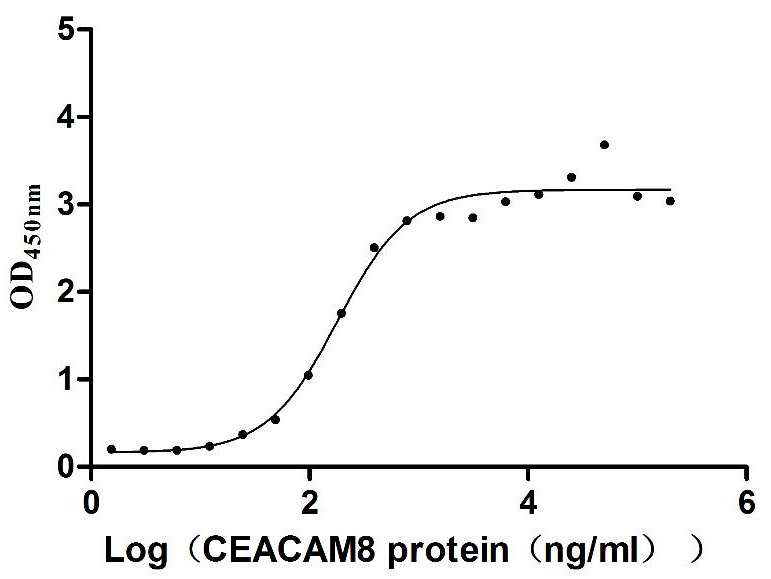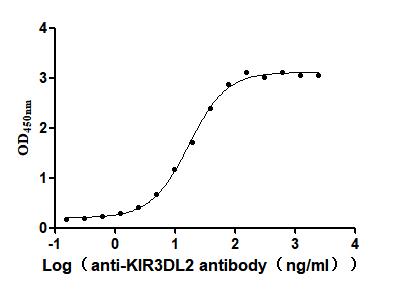Recombinant Rat Proliferating cell nuclear antigen (Pcna)
-
货号:CSB-YP017621RA
-
规格:
-
来源:Yeast
-
其他:
-
货号:CSB-EP017621RA
-
规格:
-
来源:E.coli
-
其他:
-
货号:CSB-EP017621RA-B
-
规格:
-
来源:E.coli
-
共轭:Avi-tag Biotinylated
E. coli biotin ligase (BirA) is highly specific in covalently attaching biotin to the 15 amino acid AviTag peptide. This recombinant protein was biotinylated in vivo by AviTag-BirA technology, which method is BriA catalyzes amide linkage between the biotin and the specific lysine of the AviTag.
-
其他:
-
货号:CSB-BP017621RA
-
规格:
-
来源:Baculovirus
-
其他:
-
货号:CSB-MP017621RA
-
规格:
-
来源:Mammalian cell
-
其他:
产品详情
-
纯度:>85% (SDS-PAGE)
-
基因名:
-
Uniprot No.:
-
别名:Pcna; Proliferating cell nuclear antigen; PCNA; Cyclin
-
种属:Rattus norvegicus (Rat)
-
蛋白长度:Full length protein
-
表达区域:1-261
-
氨基酸序列MFEARLIQGS ILKKVLEALK DLINEACWDI SSGGVNLQSM DSSHVSLVQL TLRSEGFDTY RCDRNLAMGV NLTSMSKILK CAGNEDIITL RAEDNADTLA LVFEAPNQEK VSDYEMKLMD LDVEQLGIPE QEYSCVVKMP SGEFARICRD LSHIGDAVVI SCAKDGVKFS ASGELGNGNI KLSQTSNVDK EEEAVSIEMN EPVQLTFALR YLNFFTKATP LSPTVTLSMS ADVPLVVEYK IADMGHLKYY LAPKIEDEEG S
-
蛋白标签:Tag type will be determined during the manufacturing process.
The tag type will be determined during production process. If you have specified tag type, please tell us and we will develop the specified tag preferentially. -
产品提供形式:Lyophilized powder
Note: We will preferentially ship the format that we have in stock, however, if you have any special requirement for the format, please remark your requirement when placing the order, we will prepare according to your demand. -
复溶:We recommend that this vial be briefly centrifuged prior to opening to bring the contents to the bottom. Please reconstitute protein in deionized sterile water to a concentration of 0.1-1.0 mg/mL.We recommend to add 5-50% of glycerol (final concentration) and aliquot for long-term storage at -20℃/-80℃. Our default final concentration of glycerol is 50%. Customers could use it as reference.
-
储存条件:Store at -20°C/-80°C upon receipt, aliquoting is necessary for mutiple use. Avoid repeated freeze-thaw cycles.
-
保质期:The shelf life is related to many factors, storage state, buffer ingredients, storage temperature and the stability of the protein itself.
Generally, the shelf life of liquid form is 6 months at -20°C/-80°C. The shelf life of lyophilized form is 12 months at -20°C/-80°C. -
货期:Delivery time may differ from different purchasing way or location, please kindly consult your local distributors for specific delivery time.Note: All of our proteins are default shipped with normal blue ice packs, if you request to ship with dry ice, please communicate with us in advance and extra fees will be charged.
-
注意事项:Repeated freezing and thawing is not recommended. Store working aliquots at 4°C for up to one week.
-
Datasheet :Please contact us to get it.
靶点详情
-
功能:Auxiliary protein of DNA polymerase delta and is involved in the control of eukaryotic DNA replication by increasing the polymerase's processibility during elongation of the leading strand. Induces a robust stimulatory effect on the 3'-5' exonuclease and 3'-phosphodiesterase, but not apurinic-apyrimidinic (AP) endonuclease, APEX2 activities. Has to be loaded onto DNA in order to be able to stimulate APEX2. Plays a key role in DNA damage response (DDR) by being conveniently positioned at the replication fork to coordinate DNA replication with DNA repair and DNA damage tolerance pathways. Acts as a loading platform to recruit DDR proteins that allow completion of DNA replication after DNA damage and promote postreplication repair: Monoubiquitinated PCNA leads to recruitment of translesion (TLS) polymerases, while 'Lys-63'-linked polyubiquitination of PCNA is involved in error-free pathway and employs recombination mechanisms to synthesize across the lesion.
-
基因功能参考文献:
- The damaged retinal pigment epithelium showed earlier expression of PCNA and RPE65 than photoreceptor out segments PMID: 29569173
- Taken together, these results indicated that ALA protected dopaminergic neurons against MPP+induced neurotoxicity through its ability to upregulate the DNA repair protein, PCNA, via the P53 pathway. PMID: 27665784
- This indicates that MPP+-induced oxidative damage is mediated by the downregulation of PCNA through the p53 pathway in a cellular model of Parkinson's disease . PMID: 26677001
- PCNA index decreased from 80 in HCC rats to 32 after boron treatment. PMID: 23219601
- The positive expression of PCNA in intestinal epithelial cells at the early development stage was much stronger and more extensive than that in mature rats. Expression was limited to intestinal crypts. PMID: 12857463
- Islet cell tumors were associated with increased nuclear expression of cyclin-dependent kinase 4 as well as increased proliferating cell nuclear antigen and decreased beta-catenin expression. PMID: 22477723
- Fluorine possibly damages the male reproductive system by reducing the expression of TERT and PCNA. PMID: 17456401
- Sex-associated difference in PCNA expression in N-methyl-N'-nitro-N-nitrosoguanidine-induced gastric cancers in rats. PMID: 22330348
- Glutamine supplementation rapidly improved the expression of PCNA after cisplatin-induced intestinal mucosal injury. PMID: 21080177
- Following melatonin treatment, pinealectomized female rats present signals of proliferation on ovarian surface epithelium and interstitial cells as well as high expressions of ovarian PCNA and vascular endothelial growth factor. PMID: 20605140
- High omega-6 polyunsaturated fatty acid diet can enhance azoxymethane-induced inhibition of P53 in colon mucosa, resulting in overexpression of PCNA, formation of aberrant crypt foci, and carcinogenesis in the colon. PMID: 20972911
- After treatment with Buyang Huanwu Decoction PCNA level was increased in rats with aortic intimal injuries. PMID: 18664354
- Compared with the control group, the PCNA level in the thyroid of rats given propylthiouracil for 3 days significantly increased. PMID: 18390212
- Exposure to diesel exhaust particles elevated transcription of proliferating cell nuclear antigen gene in rat alveolar macrophages. PMID: 12011483
- The presence of PCNA in a key anatomical location pertinent to an evolving ischaemic lesion indicates that PCNA influences cell survival in ischaemically compromised tissue. PMID: 12099899
- PCNA expression gradually decreased from prenatal day 19 onwards and has a role in growth regulation in the developing rat heart PMID: 12389741
- data show that changes in liver expression of DNA polymerase beta, Ref-1, proliferating cell nuclear antigen, and Bax are associated with peroxisome proliferator-induced carcinogenesis PMID: 12565796
- Activation of vascular smooth muscle cell Ca2+ channels and CaMKII is a key early signaling event required for upregulation of PCNA gene expression in VSMCs after oxidative injury to endothelium. PMID: 12969989
- ERK1/2 has a role in FSH induced PCNA expression and steroidogenesis in granulosa cells PMID: 15569628
- Examination by immunofluorescence techniques of tracheal cell cultures after exposure to very low doses of alpha particles revealed a large proportion of cells with proliferating cell nuclear antigen (PCNA) bound in their nuclei. PMID: 15606305
- PCNA-positive cell level was markedly higher in cadmium intoxication in submandibular gland. PMID: 15638412
- PCNA may play an important role in the damage and repair of intestinal mucosa in intrauterine ischemia PMID: 15818741
- regulation of PCNA through YY1 is affected by nucleophospmin/B23 PMID: 16099430
- In HCC, there was positive correlation between p-Stat3 level and the expression of TGFalpha and PCNA. PMID: 17031671
- PCNA may play a role in abnormal placenta formation resulting from diabetes PMID: 18377963
- Ovarian follicle counts using Pcna and semi-automated image analysis is reported. PMID: 18467674
- Pcna indexing as a preclinical immunohistochemical biological marker for testicular toxicity is reported. PMID: 19016366
- Proliferating cell nuclear antigen shRNA treatment attenuates chronic proliferative cholangitis in rats. PMID: 19032457
显示更多
收起更多
-
亚细胞定位:Nucleus.
-
蛋白家族:PCNA family
-
数据库链接:
KEGG: rno:25737
STRING: 10116.ENSRNOP00000028887
UniGene: Rn.223
Most popular with customers
-
Recombinant Human T-cell antigen CD7 (CD7), partial (Active)
Express system: Mammalian cell
Species: Homo sapiens (Human)
-
Recombinant Human Tumor necrosis factor receptor superfamily member 18 (TNFRSF18), partial (Active)
Express system: Mammalian cell
Species: Homo sapiens (Human)
-
Recombinant Mouse Prolactin receptor (Prlr), partial (Active)
Express system: Mammalian cell
Species: Mus musculus (Mouse)
-
Recombinant Mouse Transthyretin (Ttr) (Active)
Express system: Mammalian cell
Species: Mus musculus (Mouse)
-
Recombinant Human Interleukin-17A (IL17A) (T26A) (Active)
Express system: Baculovirus
Species: Homo sapiens (Human)
-
Recombinant Human Claudin-6 (CLDN6)-VLPs, Fluorescent (Active)
Express system: Mammalian cell
Species: Homo sapiens (Human)
-
Recombinant Human Carcinoembryonic antigen-related cell adhesion molecule 6 (CEACAM6) (Active)
Express system: Mammalian cell
Species: Homo sapiens (Human)
-
Recombinant Human Killer cell immunoglobulin-like receptor 3DL2 (KIR3DL2), partial (Active)
Express system: Mammalian cell
Species: Homo sapiens (Human)


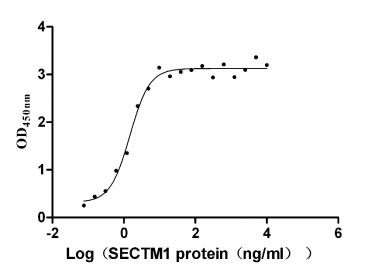
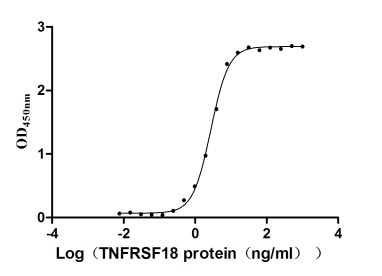
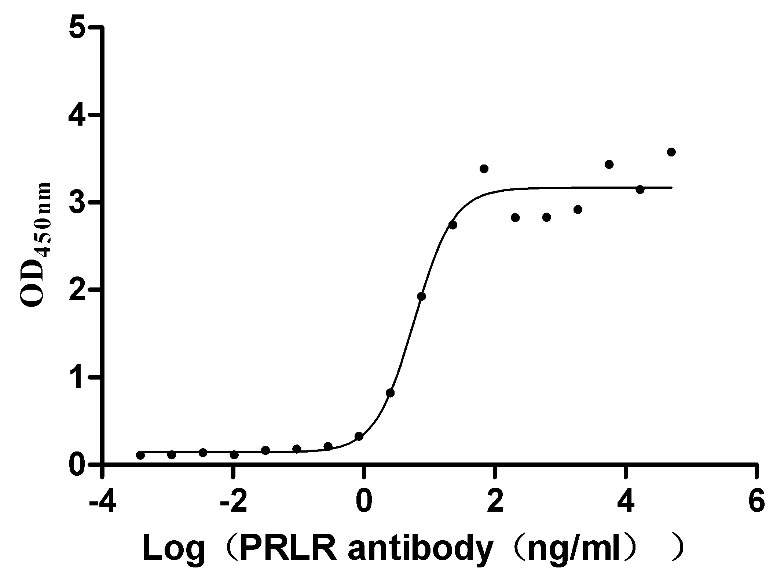
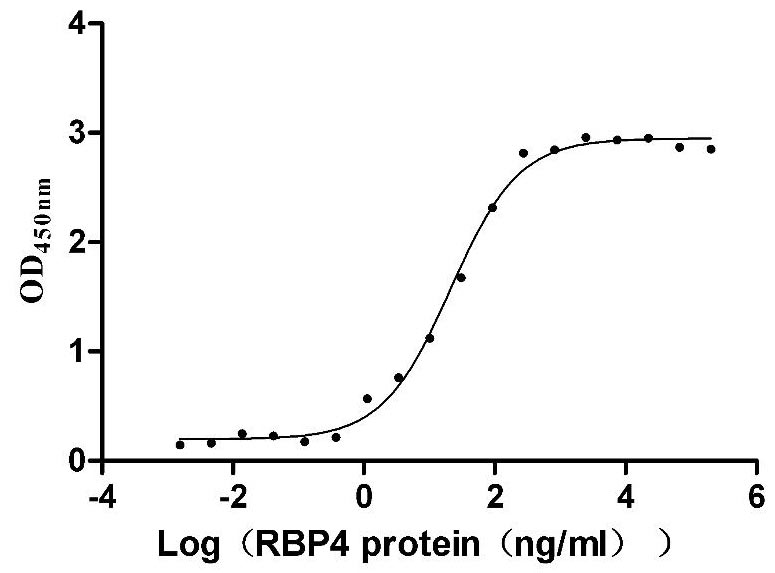
-AC1.jpg)
f4-AC1.jpg)
